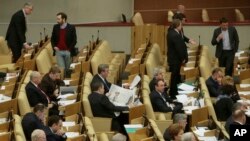The lower house of Russian parliament, Duma, has unanimously approved a decree signed by President Vladimir Putin to suspend a deal with the United States on the disposal of weapons-grade plutonium.
Earlier this month, Putin said there is an “emerging threat to strategic stability” as a result of Washington's "unfriendly actions."
Putin said the agreement would be restored if the United States withdrew its forces deployed near Russia's borders and revokes anti-Russian sanctions.
Deputy Foreign Minister Sergei Ryabkov told lawmakers Wednesday Moscow could take other steps that would be “painful'' for the United States if Washington ratchets up sanctions against Russia.
Under the agreement signed in 2000 and renewed in 2010, both nuclear powers were obliged to dispose of weapons-grade plutonium from their defense programs.
The Russian decree Wednesday also claimed the United States is unable "to ensure the implementation of its obligations to utilize surplus weapons-grade plutonium."
Based on the 2010 agreement, each side would dispose of 34 metric tons of plutonium by burning it in nuclear reactors, a quantity large enough to make almost 17,000 nuclear weapons.
Russia and the united States viewed the deal as a symbol of U.S.-Russian rapprochement and increased cooperation between them toward nuclear non-proliferation.
But ties between Moscow and Washington plunged to the lowest point since the Cold War when Russia annexed Crimea from Ukraine in 2014 and supported pro-Moscow separatists in eastern Ukraine. Washington has been instrumental in imposing Western economic sanctions on Russia for its role in the Ukraine crisis.






